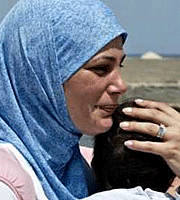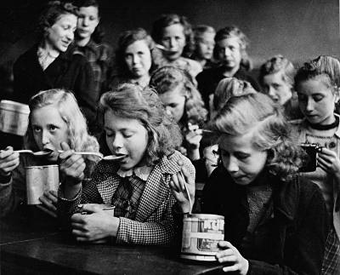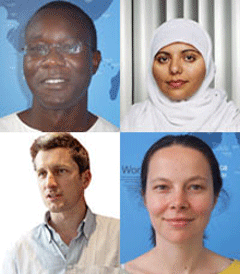Oxfam
Delivers Relief & Hope
As
Summer 2006 continues into what we Americans call “the dog days,”
we are struck with the thought that, despite wall to wall wars going on
in various places in the world, record fuel costs and temperatures that
are hotter in places than have ever been recorded, some of us can still
take for granted many things about our lives.
That can also mean that whatever we were
not paying attention to, before things became ultra complicated in 2006,
are most probably things that have been pushed even further back in our
minds in order of priority.
But aside from the war zones and the paths
of hurricanes and floods vying for attention and donations, to help the
needy, elsewhere people are still suffering unspeakable lives, not from
natural disasters, but just daily survival.
 These
emergencies did not just simply go away, they were pushed further back
from our consciousness by the headlines and concerns of today. These
emergencies did not just simply go away, they were pushed further back
from our consciousness by the headlines and concerns of today.
Right now occasionally in your local newspaper
is a story that will not and for that matter should not go away about
millions of people who face hunger and even death by starvation in Africa
brought about by decades of poor economy, drought, politics and other
factors.
Also, the impact of AIDS has caused drastic
food shortages.
Crops have dried-up in the fields and desperate
families are selling all they have, including precious livestock, to buy
food.
Prices for the dwindling supply of available
food in the market have soared.
In the United Kingdom a relief organization
called Oxfam issues reports on these world conditions.
The Oxfam website in fact might cause even
the most hardened, uninterested observer, to wonder about world priorities.
While Oxfam also gets down to business for
on the spot relief work like Red Cross and others (at times as partners),
Oxfam also challenges the status quo, bringing governments and organizations
such as WTO to task over issues of unique world interest.
Oxfam is pro-active, and seems at times
to be about challenging everybody.
“Food emergencies in Africa are occurring
three times more often now than in the mid-1980’s, but the global
response to famine continues to be too little, too late."
Writing of a report just published by Oxfam,
Reuters quoted the agency as saying:
"It will cost the world far less to
make a major investment now in tackling root causes of hunger than continuing
the current cycle of too little, too late that has been the reality of
famine relief in Africa for nearly half a century.
“But despite that, a myopic, short-term
focus has prevailed, with emergency food aid still dominating international
action on Africa, rather than long-term support of agriculture, infrastructure
and social safety nets,” Oxfam said.
Particularly hard-hit in all of this have
been the poorest and most vulnerable, especially the elderly, the children,
AIDS-affected orphans and chronically ill, and pregnant and nursing women.
 Southern
Africa has the highest HIV/AIDS prevalence rates in the world. Southern
Africa has the highest HIV/AIDS prevalence rates in the world.
In some countries, more than 30 percent
of the adult population is infected.
Without much attention to long-term solutions,
the need to deliver relief supplies continues.
Oxfam, it turns out has been a leading world
relief organization since its founding in UK during 1942 when a group
of Quaker intellectuals, social activists, and Oxford academics formed
the Oxford Committee for Famine Relief in response to the plight of refugees
in Greece.
After the war, Oxfam (a name derived from
its postal code abbreviation) continued its work, sending materials and
financial aid to groups, aiding the poor throughout Europe.
As the situation in Europe improved, Oxfam's
attention shifted to the needs of people in developing countries.
Today Oxfam has strong chapters in USA and
elsewhere with work going on in dozens of countries, as the organization
is both watchdog and campaigner for empowerment to world humanitarian
trouble spots.
 Oxfam,
all conversation aside is on the spot with hands on immediate help to
stricken areas. Oxfam,
all conversation aside is on the spot with hands on immediate help to
stricken areas.
Currently Oxfam is helping innocent people
caught up in the escalating violence in Lebanon and in Gaza, having deployed
an emergency team to the area last week.
Oxfam’s Rapid Response Team flew into
Damascus, Syria and then traveled by road across the border into Lebanon.
Oxfam’s emergency response team: Obia
Nixon (top left), Shaista Aziz (top right), Graham Mackay (bottom left),
Nathalie Wirt (bottom right) are working to assess what people’s
needs are in Lebanon, and will support and advise Oxfam’s partners
on the distribution of vital relief items.
“More than a million people have now
fled their homes in southern Lebanon and are living in schools, parks
and public buildings.
“Fuel and essential items such as
medicines are in short supply because of the Israeli blockade.”
In Gaza, Oxfam is funding essential water
and sanitation equipment that will ensure people have clean water, and
that sewage is properly dealt with.
Oxfam has given a grant of $300,000 to the
Coastal Water Utilities Management Company for the purchase of pipes and
water accessories.
With partners, Oxfam is providing practical
help now–and calling on all sides to the conflict to immediately
cease military attacks.
“While Oxfam and others provide aid
on the ground, the international community should act now to ensure that
civilians are protected from violence.
“Oxfam is committed to creating lasting
solutions to global poverty, hunger, and social injustice.”
(Read More & Donate) www.oxfam.org.uk.
|



